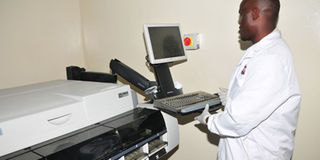Medics renew call for war against hepatitis

Mr Gilbert Abwooli shows the machine, Architect i2000sr, at Nakasero Blood Bank that is used to test blood for HIV, and Hepatitis B and C viruses. PHOTO/FILE
What you need to know:
- Hepatitis, according to the World Health Organisation (WHO), has become a public health challenge of global proportions.
A section of medical personnel across the country have amplified the call to fight against hepatitis as the world commemorates World Hepatitis Day today under the theme “Hepatitis Can’t Wait.”
The different medical personnel spoke on Monday on the subject during an online conference organised to focus on integrating viral hepatitis services in the maternal health programme.
Dr Rachel Beyagira, the technical officer on hepatitis at the Ministry of Health, noted that hepatitis is a continuous health burden in the country, given the various challenges that make its eradication difficult.
“These include low sensitisation in communities, non-functionality of the treatment centres at most general hospitals, drugstock outs, limited donor support to run hepatitis activities at both national and district levels,” Dr Beyagira said.
“And when Covid-19 came into the picture, the pandemic affected other essential care services, including tackling hepatitis. It became difficult to test, while already diagnosed patients found it difficult to access treatment,” she added.
As part of her recommendations, Dr Beyagira called for increased awareness of viral hepatitis by working with community groups and civil society organisations, systematic mass screening, among other interventions.
Meanwhile, Dr Nelson Musoba, the director general of Uganda Aids Commission (UAC) spoke on the close relationship between specifically Hepatitis B and HIV/Aids, noting that both are blood borne viruses transmitted primarily through body fluids, blood and injection drug use.
“A high proportion of adults can be at risk for both HIV/Aids and a hepatitis infection through the sexual route,” Mr Musoba said.
Mr Musoba said it was important to specifically fast-track and sustain the elimination of hepatitis in the country through advocacy campaigns, mobilisation and utilisation of resources.
Dr Richard Idro, the president of Uganda Medical Association (UMA), said it is important that all health workers get vaccinated against the virus as a strategy to protect themselves, as well as the patients.
Hepatitis, according to the World Health Organisation (WHO), has become a public health challenge of global proportions. Although there are five distinct types of viral hepatitis; A, B, C, D and E, chronic Hepatitis B and C cause 95 per cent of hepatitis-related sickness and untimely deaths. However, timely testing and treatment can save lives.




